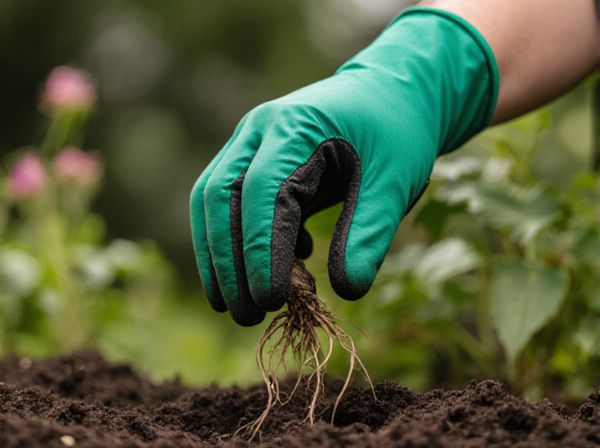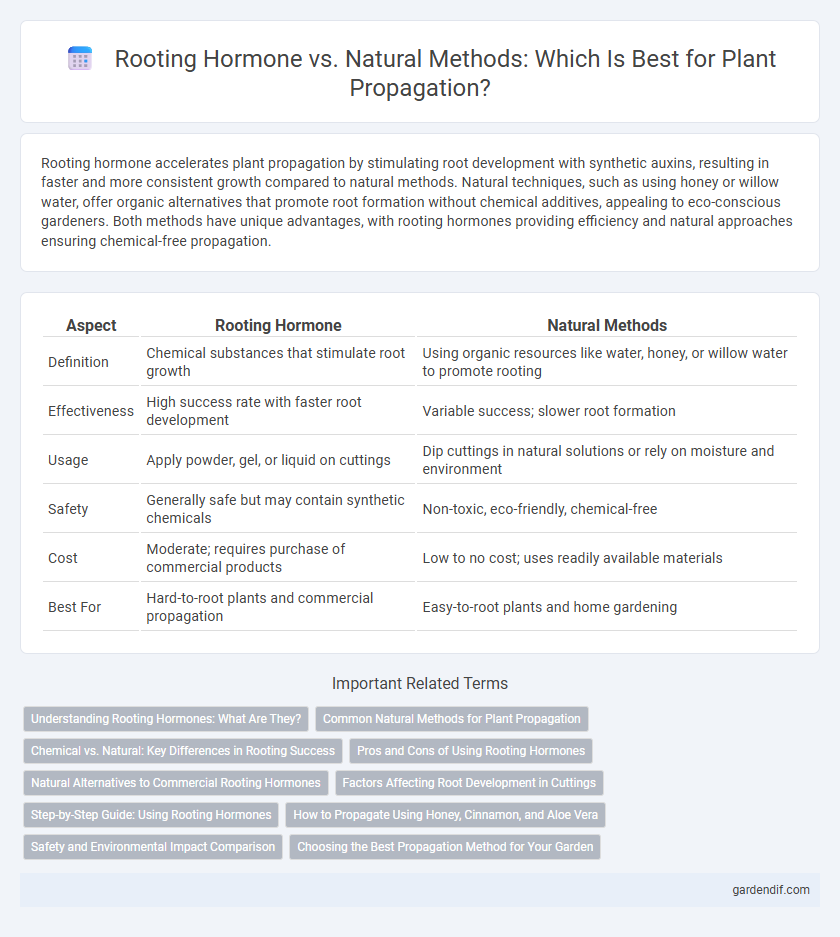
Rooting hormone vs natural methods Illustration
Rooting hormone accelerates plant propagation by stimulating root development with synthetic auxins, resulting in faster and more consistent growth compared to natural methods. Natural techniques, such as using honey or willow water, offer organic alternatives that promote root formation without chemical additives, appealing to eco-conscious gardeners. Both methods have unique advantages, with rooting hormones providing efficiency and natural approaches ensuring chemical-free propagation.
Table of Comparison
| Aspect | Rooting Hormone | Natural Methods |
|---|---|---|
| Definition | Chemical substances that stimulate root growth | Using organic resources like water, honey, or willow water to promote rooting |
| Effectiveness | High success rate with faster root development | Variable success; slower root formation |
| Usage | Apply powder, gel, or liquid on cuttings | Dip cuttings in natural solutions or rely on moisture and environment |
| Safety | Generally safe but may contain synthetic chemicals | Non-toxic, eco-friendly, chemical-free |
| Cost | Moderate; requires purchase of commercial products | Low to no cost; uses readily available materials |
| Best For | Hard-to-root plants and commercial propagation | Easy-to-root plants and home gardening |
Understanding Rooting Hormones: What Are They?
Rooting hormones are gel, powder, or liquid substances containing auxins such as indole-3-butyric acid (IBA) or naphthaleneacetic acid (NAA) that stimulate root development in plant cuttings. These synthetic or naturally derived compounds enhance cell division and elongation at the cutting base, accelerating root initiation compared to natural methods like water or soil propagation. Using rooting hormones increases success rates and reduces the time required for young plants to establish a robust root system, especially in difficult-to-root species.
Common Natural Methods for Plant Propagation
Common natural methods for plant propagation include stem cuttings, leaf cuttings, and division, which rely on the plant's inherent ability to develop roots and new shoots. Using water or soil to encourage root growth allows plants like coleus, pothos, and spider plants to propagate without synthetic rooting hormones. These natural techniques harness plant hormones such as auxins, present in the cuttings, to stimulate root initiation and increase the success rate of propagation.
Chemical vs. Natural: Key Differences in Rooting Success
Rooting hormone contains synthetic auxins like indole-3-butyric acid (IBA) that accelerate root formation by stimulating cell division, resulting in higher success rates and faster propagation compared to natural methods. Natural rooting methods rely on endogenous plant hormones and physiological processes, often producing variable results influenced by species and environmental conditions. Chemical rooting hormones provide consistency and efficiency, while natural methods emphasize eco-friendliness and sustainability but with less predictable rooting outcomes.
Pros and Cons of Using Rooting Hormones
Rooting hormones accelerate root development by providing concentrated auxins that stimulate cell division and elongation, resulting in faster propagation success rates compared to natural methods. However, overuse of synthetic rooting hormones can lead to chemical burns on plant cuttings and potential environmental concerns due to runoff. Natural methods, while slower and less predictable, avoid chemical exposure and promote healthier root systems through organic growth processes.
Natural Alternatives to Commercial Rooting Hormones
Natural alternatives to commercial rooting hormones include substances such as honey, cinnamon, and willow water, which contain natural auxins and antifungal properties promoting root development. Using willow water, made by soaking young willow branches, provides indolebutyric acid (IBA), a key rooting hormone, enhancing root growth in cuttings. These organic methods offer an eco-friendly and chemical-free approach to propagation, improving success rates while reducing environmental impact.
Factors Affecting Root Development in Cuttings
Rooting hormone significantly enhances root development in cuttings by providing synthetic auxins that stimulate cell division and elongation, leading to faster and more robust root formation. Natural methods, such as using willow water or honey, supply organic compounds and enzymes that support root initiation but often result in slower and less consistent rooting compared to commercial hormones. Key factors affecting root development include the type and concentration of the rooting hormone, cutting species, environmental conditions like temperature and humidity, and the physiological state of the parent plant.
Step-by-Step Guide: Using Rooting Hormones
Applying rooting hormones accelerates root development by stimulating cell growth at the cutting base, increasing success rates in propagation. Begin by selecting healthy cuttings, trimming just below a node, then dipping the cut end into a powdered or gel rooting hormone to ensure even coverage. Place the treated cutting into a well-draining propagation medium, maintain consistent moisture and warmth, and monitor for root emergence typically within 1-3 weeks.
How to Propagate Using Honey, Cinnamon, and Aloe Vera
Honey, cinnamon, and aloe vera serve as natural rooting hormones by promoting root development and protecting cuttings from infections. Honey contains antibacterial properties that reduce fungal growth, cinnamon acts as an antifungal agent that stimulates root initiation, and aloe vera provides vitamins and enzymes that nourish cuttings and enhance root formation. Applying these substances to plant cuttings before planting can significantly improve propagation success rates without the need for synthetic chemicals.
Safety and Environmental Impact Comparison
Rooting hormone products often contain synthetic chemicals that may pose risks to soil microbiomes and aquatic ecosystems if not used responsibly. Natural propagation methods, such as water or soil layering, avoid chemical inputs, reducing potential environmental contamination and promoting safer handling for gardeners. Choosing natural techniques supports sustainable gardening practices with minimal ecological footprint and eliminates concerns over chemical exposure.
Choosing the Best Propagation Method for Your Garden
Rooting hormones accelerate root development by providing essential auxins that stimulate cell growth, improving success rates especially in difficult-to-root plants. Natural methods, such as water propagation or using honey or willow extract, offer eco-friendly alternatives with slower root formation but promote healthier, more resilient root systems. Choosing the best propagation method depends on plant species, desired propagation speed, and garden sustainability goals.
Rooting hormone vs natural methods Infographic

 gardendif.com
gardendif.com